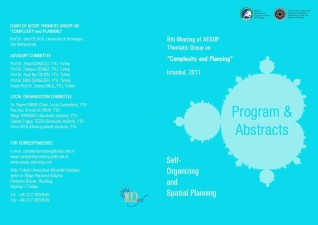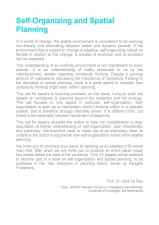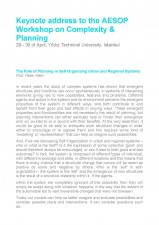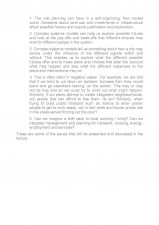This is a little late, but it is worth posting news about the 9th Meeting of AESOP Thematic Group on Complexity and Planning. This meeting/conference was held in Istanbul and provided a platform for discussions on the role and importance of Complexity (with a special emphasis on Self Organisation) within planning and design. The most pleasurable mention was the keynote speech by Dr Peter Allen, who introduced the subject and the possibilities extremely coherently and succinctly, covering so much ground that:
1) It made me realise that we should have referred to his work directly as soon as we started our own explorations.
2) I had to re-write 2/3rds of my presentation overnight in order not to overlap with subjects Peter had already covered.
3) There was an easy reference point for a large part of my discussion, meaning that I did not have to attempt to define the conceptual framework of presented work.
Please see the attached keynote sheets.
Softgrid presented a paper on new tools and modelling methods for complex urban environments based on work done in co-operation with University of Nottingham students in China (abstract below).
DIGITAL TOOLS – FLUX TERRITORIES (Abstract)
Current practices of planning and urban design have an inability to adequately cope with, and successfully intervene within the complex spatio-temporal nature of our cities. With current trends of urbanisation indicating increasingly informal cities, there is an even greater requirement for new approaches to address self organising systems and emergent urban ecologies. Unit 6, from the University of Nottingham, Department of Architecture and the Built Environment, is a specialised graduate research studio involved in the development of digital tools for ‘flux territories’ – the use of parametric and algorithmic modelling techniques to address complex urban territories in states of rapid change. In 2010, the city of Jingdezhen in China was the site of investigation using both remote and street level methods, resulting in the development of time based digital tools aimed at critically addressing rapid growth, planning policy and informal fabric. The developed tools demonstrate future possibilities based on influenceable temporal spatial models, enabling generation of socio-spatial patterns and future scenarios with implied and inherent possibilities.
Tags: aesop, Architecture, complex system, complexity, emergence, planning, self organisation, soft-grid, softgrid, spatial planning, territory, urban, urban design





